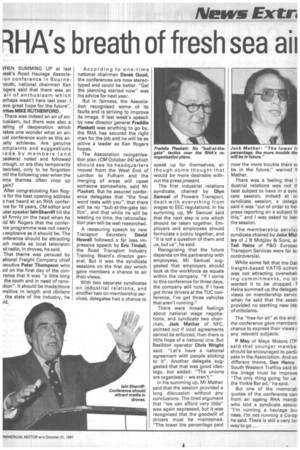RHA's breath of fresh sea ail
Page 15

If you've noticed an error in this article please click here to report it so we can fix it.
VHEN SUMMING UP at last ieek's Road Haulage Associaion conference in Bournelouth, national chairman Ken ogers said that there was an air of enthusiasm which erhaps wasn't here last year. I ave great hope for the future", ffites MIKE RUTHERFORD,
There was indeed an air of enIusiasm, but there was also a ?eling of desperation which lakes one wonder what an anual conference such as this acrally achieves. Are genuine omplaints and suggestions rade by members (and 3eakers) noted and followed rough, or are they temporarily bsorbed, only to be forgotten ntil the following year when the )me themes often crop up gain?
After congratulating Ken Rog-s for the best opening address a had heard at an RHA confer-ice for 16 years, CM editor and Jest speaker lainSherriff hit the ail firmly on the head when he lId Mr Rogers that the confer:Ice programme was not nearly ; explosive as it should be. The )nference should be attracting rch media as local television ld radio, in droves, he said.
That theme was persued by atonal Freight Company chief cecutive Peter Thompson who lid on the final day of the conrence that it was "a little long the tooth and in need of renoition". It should be made more Insitive in length and content the state of the industry, he lid. According to one-time national chairman Derek Good, the conferences are now stereotyped and could be better. "Get the planning started now" was his advice for next year.
But in fairness, the Association recognised some of its faults and is striving to improve its image. If last week's speech by new director general Freddie Plaskett was anything to go by, the RHA has secured the right man for the job and he will be as active a leader as Ken Rogers hopes.
The Association reorganisation plan (CM October 24) which should see its headquarters moved from the West End of London to Fulham and the merging of areas will upset someone somewhere, said Mr Plaskett. But he assured conference delegates that "the final word rests with you", that there will be no "bull-at-the-gate tactics", and that while he will be wasting no time, the rationalisation plan will be well researched.
A reassuring speech by new Transport Secretary David Howell followed a far less impressive speech by Eric Tindall, the Road Transport Industry Training Board's director general. But it was the syndicate sessions on the first day which gave members a chance to air their views.
With two separate syndicates on industrial relations, and another two on membership services, delegates had a chance to speak up for themselves, although some thought that would be more desirable without the press present.
The first industrial relations syndicate, chaired by Glyn Samuel of Flowers Transport, dealt with everything from wages to EEC regulations. In his summing up, Mr Samuel said that the next step is one which should be taken together. Employers and employees should formulate a policy together, and "it is not a question of them and us, but us", he said.
Recognising that the future depends on the partnership with employees, Mr Samuel suggested that employers should look at the workforce as equals within the company. "If I come to this conference for three days, the company still runs. If I have got three drivers at the TUC conference, I've got three vehicles that aren't running."
There were mixed feelings about national wage negotiations, and syndicate two chairman, Jack Mather of NFC, pointed out if local agreements cannot be enforced, then there is little hope of a national one. But Basildon operator Chris Wright said: "Let's have a national agreement with people sticking to it". Another delegate suggested that that was good ideology, but added: "The unions are organised — we aren't."
In his summing up, Mr Mather said that the session provided a long discussion without any conclusions. The tired argument that "we can afford very little" was again expressed, but it was recognised that the goodwill of drivers must be maintained. "The lower the percentage paid now the more trouble there w be in the future," warned IN Mather.
There was a feeling that i dustrial relations was not tt best subject to have in a sync cate session. Indeed at or syndicate session, a delega said it was "out of order to ha) press reporting on a subject Iii this," and I was asked to lea) the session.
The membership servicc syndicate chaired by John Mid ley of J B Midgley & Sons, at Ted Heins of P&O EuropeE Transport Services were far lel controversial.
While some felt that the Dat freight-based VATIS schen was not attracting overwhelr ing commitments, no or wanted it to be dropped. P Heins summed up the delegatE views on membership servic when he said that the sessic provided no startling new ide of criticisms.
The "free-for-all" at the end the conference gave members chance to express their views c any relevant subjects.
P May of Mays Motors (TP said that younger membe should be encouraged to partic pate in the Association. And on different theme, Dan Henry South Western Traffics said th the image must be improve "The only thing going for us the Yorkie Bar ad," he said.
But one of the memorab quotes of the conference can from an ageing RHA memb who told a syndicate sessio "I'm running a haulage bur ness. I'm not running a Co-op he said. There is still a very lor way to go ...










































